I currently have and application that is using Identity to authorize users. I need to change it to use Azure AD to login. After being authenticated through azure I need to use the information of the logged in user that we have in the identity database. After the user is authenticated I get a NullReferenceException: Object reference not set to an instance of an object. and fails at this point: ApplicationUser user = await manager.FindByNameAsync(context.Principal.Identity.Name);
```
public void ConfigureServices(IServiceCollection services)
{
services.AddAuthentication().AddOpenIdConnect(c =>
{
c.Authority = "https://login.microsoftonline.com/common";
c.ClientId = "<insert-registered-guid>";
c.TokenValidationParameters = new TokenValidationParameters
{
ValidateIssuer = false
};
c.Events.OnTokenValidated = async context =>
{
UserManager<ApplicationUser> manager = context.HttpContext.RequestServices.GetService<UserManager<ApplicationUser>>();
SignInManager<ApplicationUser> signIn = context.HttpContext.RequestServices.GetService<SignInManager<ApplicationUser>>();
ApplicationUser user = await manager.FindByNameAsync(context.Principal.Identity.Name);
if (user != null)
{
await signIn.SignInAsync(user, false);
}
};
});
}
// HomeController.cs
using Microsoft.AspNetCore.Authentication.OpenIdConnect;
public class HomeController : Controller
{
[AllowAnonymous]
public IActionResult LoginWithAzure()
{
string redirectUrl = Url.Content("~/");
return Challenge(new AuthenticationProperties { RedirectUri = redirectUrl }, OpenIdConnectDefaults.AuthenticationScheme);
}
}
```
UPDATE:
I was able to get past the error because I was missing
services.AddIdentity
Now the issue is that it gets stuck in a loop inside the OnTokenValidated.
UserManager<ApplicationUser> manager = context.HttpContext.RequestServices.GetService<UserManager<ApplicationUser>>();
SignInManager<ApplicationUser> signIn = context.HttpContext.RequestServices.GetService<SignInManager<ApplicationUser>>();
ApplicationUser user = await manager.FindByNameAsync(context.Principal.Identity.Name);
if (user != null)
{
await signIn.SignInAsync(user, false);
}
after the if statement it goes back to the manager line.
